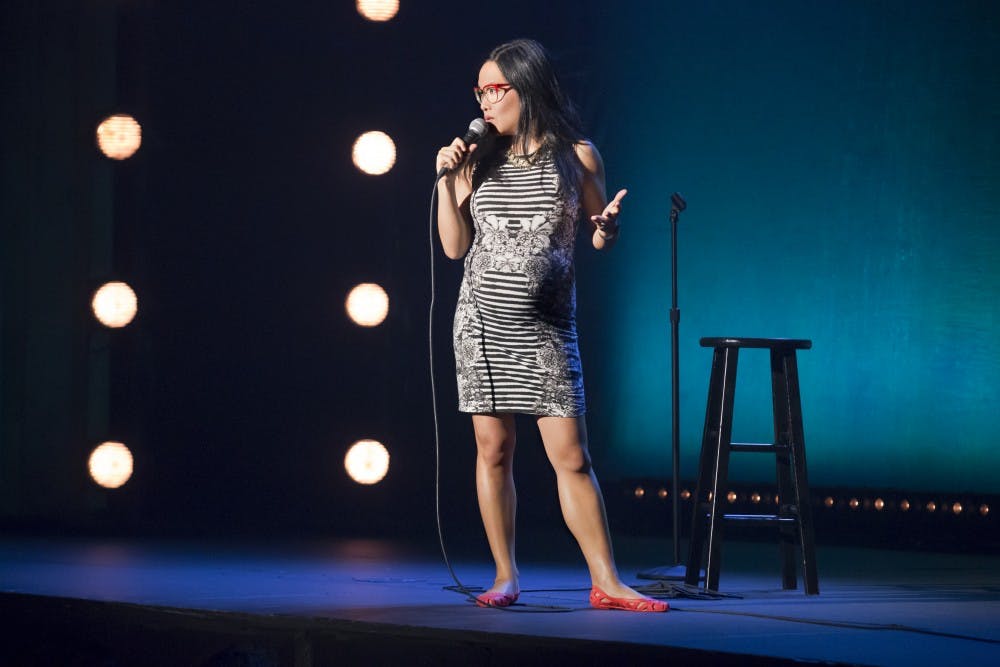Thanks to social media and Netflix Specials, it appears that today we’re in a golden age for comedy. To date, Netflix has distributed nearly 200 original stand–up specials featuring household names like Jerry Seinfeld, Ellen DeGeneres, and Kevin Hart while introducing lesser–known names through The Comedy Lineup, Comedians of the World and several other stand–up collections. Today, comedy pushes beyond the stage. Twitter, operating through memes and one–liners, has kickstarted several careers in comedy. Now more than ever among the many garnering laughs are women of all backgrounds.
Due to stand-up's narrative arc, we need parity in comedy. Stand–up, from the time of searing Joan Rivers sets, has existed as a way to pair personal experiences with punchlines. Through comedy, you can share and laugh about your experiences. It’s no doubt that the experiences of women of all backgrounds are just as valid and funny. Last summer Netflix released Hannah Gadsby’s: Nanette, which broke ground in stand–up. Australian comic Hannah Gadsby used the stage to share personal revelations of gender, sexuality, childhood and sexual trauma. The show works so well because Gadsby forces the audience to feel her pain and resilience while tempering these experiences with the humor that has ultimately helped her cope.
Other female comedians like Tig Notaro and Wanda Sykes have used stand–up performances to grapple with their experiences of homophobia and discrimination, enraging and enlightening their audiences simultaneously. Wanda Sykes, well–known for her T.V. appearances on Curb Your Enthusiasm and Black-ish, is a master of live performances. From performing at the White House Correspondents dinner to appearing in her recently–released Not Normal Netflix Special, Sykes has skillfully delivered commentary on politics and racism with punchlines. On Happy to Be Here, Tig Notaro jokes about her public image and her experience with cancer in a way that is much funnier than you could imagine those topics to be.
Among deep, dark and personal honesty coming from women in comedy, there’s also a fair share of women performing the traditional irreverent version of the genre. Uncensored and “un–ladylike,” many female comedians have become extremely successful by talking about topics often perceived as taboo for women to talk about. In her two Netflix specials, Ali Wong proves that motherhood and marriage doesn't exclude women from the raunchy jokes that litter male comedy. Between jokes about marriage and motherhood, she confidently and hilariously delves into her sexual adventures.
Meanwhile, Iliza Shlesinger who appeared on four Netflix specials and performs to sold-out crowds internationally has concocted a brand of laugh–out–loud comedy by talking about the millennial dating experience, coupled with funny voices and the occasional bird impression. In the same vein, Sofía Niño de Rivera dominates stand–up in Latin America with her rant–like style of comedy. Reaching an international audience on her latest Netflix Special, Exposed, she’s crude and candid, giving her opinion about everything from having kids to peeing in public restrooms in a way that’s undeniably funny.
Traditionally, comedy—like many industries—has been a Boy’s Club. Comedic writers, stand-up comedians, and late-night hosts have overwhelmingly been men. Throughout the 20th Century, female comedians like Carol Burnett, Fanny Brice, and Phyllis Diller were trail–blazers for women to enter comedy and proved to the world that, yes, women are really just as funny as men.
Amongst all this progress, however, there’s still a gender gap in comedy that female comedians must face. In 2018, all ten of the World’s Highest Paid Comedians were male. In an interview with Town & Country, Tina Fey struggles to accept this discrepancy as the norm, saying, "No, it's a terrible time. If you were to really look at it, the boys are still getting more money for a lot of garbage, while the ladies are hustling and doing amazing work for less." Thus, in order to truly support female comedians, we need to patron them just as much as we laugh with them. Watch their comedy specials. Get front row seats at their movies. Worship them with the same fervor and dedication as John Mulaney or Hasan Minhaj.
With the arrival of more comedy specials featuring female-comedians on Netflix this July, including Katherine Ryan: Glitter Room and Whitney Cummings: Can I Touch It?, it’s important to remind ourselves that supporting female comedians isn't just the right, equitable thing to do, but also the beneficial one. Female voices are funny—that much is already obvious. But they're also fresh, offering both familiar and foreign perspectives on the human experience in ways that genres bend and grow with each passing laugh.

